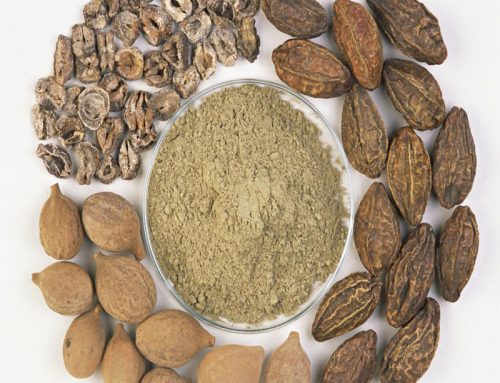- Reduces blood sugar
- Has anti-cancer properties
- Reduces cortisol (belly fat hormone)
- Reduces stress
- Reduces insomnia
- Boosts testosterone & increases male fertility
- Increases muscle mass, strength & endurance
- Reduces inflammation Lowers cholesterol & triglycerides
- Improves brain function
Ashwaganda benefits your Brain, Thyroid & even your Muscles
Ashwaganda is an adaptogenic herb that’s popular in Ayurvedic medicine and has been used for more than 3,000 years. It’s actually the most commonly used and extensively researched adaptogen herb. It’s valued for its thyroid-modulating, neuroprotective, anti-anxiety, antidepressant and anti-inflammatory properties, which are just some of the many ashwaganda benefits.
In India, ashwaganda is known as the “strength of the stallion” because it has traditionally been used to strengthen the immune system after illness. It has also been referred to as “Indian ginseng” because of its ability to enhance your stamina and work as a natural stress reliever.
In fact, it’s ashwaganda’s ability to work as a stress-protective agent that has made it such a popular herb. Like all adaptogenic herbs, ashwaganda helps the body to maintain homeostasis, even in moments of emotional or physical stress. But the many ashwaganda benefits don’t stop there. This powerful herb has shown incredible results for lowering cortisol levels and balancing thyroid hormones. Plus, it’s been used for mood disorders and in the prevention of degenerative diseases.
In Ayurvedic medicine, ashwaganda is characterized as a “rasayana,” which means that it’s used to promote your physical and mental health, to defend your body against disease and damaging environmental factors, and to slow down the aging process. In India, ashwaganda has been used as a broad-spectrum remedy for centuries, but more recently scientists have proven that is possesses anti-inflammatory and antioxidant properties that play a major role in the many ashwaganda benefits.
Benefits of Ashwaganda:
- Improves Under active Thyroid Function, even Hashimoto’s disease.
A 2017 pilot study published in the Journal of Alternative and Complementary Medicine, ashwaganda benefits for helping patients with subclinical hypothyroidism were evaluated. The 50 participants were diagnosed with thyroid disorder, but didn’t display obvious symptoms of thyroid deficiency. During an 8-week period, the treatment group received 600 milligrams of ashwaganda root extract daily, and the control group received starch as the placebo. Researchers found that ashwaganda improved serum thyroid stimulating hormone (TSH) and thyroxine (T4) levels significantly compared to placebo. It was concluded that ashwaganda may be beneficial for normalizing thyroid levels in patients with hypothyroidism.
And a study published in the Journal of Ayurveda and Integrative Medicine also found that ashwaganda has thyroid-enhancing properties. In the study, patients with bipolar disorder used ashwaganda to improve cognitive function for an 8-week period. Lab testing found that some of these patients experienced T4 increases during the treatment period, although that was not the original purpose of the study.
- Relieves Adrenal Fatigue & lowers Cortisol levels
Research shows that ashwaganda may be useful in supporting adrenal function and helping you to overcome adrenal fatigue. Your adrenals are endocrine glands that are responsible for releasing hormones, specifically cortisol and adrenaline, in response to stress. Cortisol is often referred to as the “belly fat” hormone.
If your adrenals are overtaxed due to an overabundance of emotional, physical or mental stress, this can lead to a condition referred to as adrenal fatigue. When your adrenals become exhausted, this can also disrupt other hormones in your body, including progesterone, which can cause infertility and lower levels of DHEA, a hormone that’s tied to longevity and maintaining a strong body.
- Combats Stress & Anxiety
One of the most well-known ashwaganda benefits is its ability to work as a natural remedy for anxiety. In a 2009 study published in PLOS One, ashwaganda was shown to be comparable to common pharmaceutical drugs lorazepam and imipramine, without the side effects.
In the 12-week controlled study, 75 participants with anxiety were divided into two groups, one that received naturopathic care and another that received standardized psychotherapy intervention. The naturopathic care group received dietary counseling, deep breathing relaxation techniques, a standard multi-vitamin and 300 milligrams of ashwaganda twice daily. The psychotherapy intervention group received psychotherapy, deep breathing relaxation techniques and placebo pills twice daily.
When anxiety levels were measured after the 12-week period, the group who received ashwaganda had anxiety scores that decreased by 55 percent and the psychotherapy group’s scores decreased by 30.5 percent. Significant differences between the two groups were also found in mental health, concentration, social functioning, vitality, fatigue and overall quality of life, with the ashwaganda group displaying greater clinical benefits.
In addition to these positive findings, researchers indicated that no serious side effects occurred in either group. A major ashwaganda benefit is that there are no or minimal adverse reactions when taking it, compared to antidepressant and anti-anxiety medications that may cause drowsiness, insomnia, loss of sexual desire and increased appetite, among other side effects.
- Improves Depression
Not only does ashwaganda benefit people who deal with anxiety and chronic stress, but it can also be helpful for people who experience signs of depression. Ashwaganda improves our resistance towards stress and studies show that it thereby improves people’s self-assessed quality of life. As stress is a known cause of depression, as is hormonal imbalances, ashwaganda can potentially work as a natural remedy for depression.
In a 2000 experimental study involving rats, ashwaganda efficacy was compared to the antidepressant medication imipramine. Researchers found that ashwagandha exhibited antidepressant effects that were comparable to imipramine when rats were exposed to “behavioral despair” and “learned helplessness” tests. It was concluded that ashwagandha can be used as a mood stabilizer in clinical conditions of depression.
- Balances Blood Sugar levels
Ashwaganda has been evaluated for its anti-diabetic effects, which are possible because of the presence of phenolic compounds, including flavonoids. Research shows that flavonoids possess hypoglycemic activities and a study involving rodents concluded that both ashwaganda root and leaf extracts helped to achieve normal blood sugar levels in diabetic rats.
An animal study published in Reports of Biochemistry and Molecular Biology found that when ashwaganda was given to fructose-fed rats, it inhibited the fructose-induced increases in glucose, insulin resistance and inflammation. This data suggests that ashwaganda extract may be helpful in improving insulin sensitivity and reducing inflammatory markers in humans.
- Helps Fight Cancer
Research suggests that ashwaganda has promising anti-tumor effects, can help to reduce tumor growth and may work to prevent cancer cells from growing. The extract has been shown to help inhibit the proliferation of cancer cells — specifically breast, lung, stomach and colon cancer cells, which are among some of the leading types of cancers in the world. It’s believed that ashwagandha helps to prevent the growth of cancer cells mostly due to its immune boosting and antioxidant abilities.
In addition to the anti-cancer ashwaganda benefits that have been displayed in multiple studies, researchers also suggest that the herb can help to reduce the side effects of anti-cancer agents that can reduce immunity and quality of life. According to an overview published in the African Journal of Traditional, Complementary and Alternative Medicines, ashwaganda acts as an immunomodulator that can enhance the life span of cancer patients, who are especially at risk of lowered immunity.
An animal study published in the Journal of Ethnopharmacology found that supplementing with ashwaganda was correlated with an increase in white blood cells within the body, which indicates that the immune system is better able to protect the body from disease and harmful invaders when using this herb. The decreased count of white blood cells in the body after chemotherapy is a major concern because it puts cancer patients at a much higher risk of health issues like contracting an infection. This is why ashwaganda may serve as a complementary addition to conventional cancer treatments.
- Reduces Brain Cell Degeneration & Improves Memory
Emotional, physical and chemical stress can all have damaging effects to the brain and nervous system. Recent research has proven that ashwaganda is more than a stress reliever, it also protects the brain from cell degeneration, which can lead to neurodegenerative diseases like Alzheimer’s and Parkinson’s. One of the main reasons ashwaganda is so effective at healing the brain is because it contains powerful antioxidants that destroy the free radicals that cause aging.
Withaferin A and withanolide D are the two main withanolides in ashwaganda that are used to improve cognitive function. Withanolides are naturally occurring steroids that are commonly present in plants of the nightshade family. When these steroids were injected into rodents to test their cognitive-improving abilities, researchers found that they helped to promote cell outgrowth, reverse behavioral deficits and plaque buildup, and reduce amyloid beta burden, which is crucially involved in the development of Alzheimer’s disease.
A 2017 pilot study published in the Journal of Dietary Supplements found that ashwaganda effectively enhanced both immediate and general memory in people with mild cognitive impairment. The herb was also able to improve attention, information processing speed and mental skills. The study involved 50 adults who received 300 milligrams of ashwaganda root extract or placebo for an 8-week period. Researchers concluded that ashwagandha treatment was able to boost memory and other cognitive skills.
- Boosts Immune Function
Because ashwaganda works as an adaptogen that can reduce the body’s stress hormones, it can help to boost your immune system and reduce inflammation within the body. Animal and laboratory research show that ashwaganda can enhance immune function by increasing immunoglobulin production. It is also able to promote an anti-inflammatory environment by suppressing pro-inflammatory cytokines. By down regulating the immune system when it’s compromised, ashwaganda might be a useful tool in the treatment of various inflammatory disorders.
- Increases Stamina & Endurance
Studies have shown that ashwaganda can boost endurance during physical activity by sharpening brain function and reducing bodily pain. Due to its positive calming, yet energizing effects on the brain, and its ability to lower stress hormones, ashwaganda showed improvements in concentration, motivation and stamina in conducted studies.
A 2015 double-blind, randomized and placebo-controlled study conducted in India evaluated the efficacy of ashwaganda extracts in enhancing cardiorespiratory endurance in 50 healthy adult athletes. During a 20-minute shuttle run test, the oxygen consumption of each participant’s peak physical exertion was measured. The participants were also given a questionnaire about their physical health, psychological health, social relationships and environmental factors to access changes in their quality of life after ashwaganda treatment. Researchers found that ashwaganda extracts improved cardiorespiratory endurance at 8 and 12 weeks of treatment, and significantly improved the quality of life scores of the participants in the ashwaganda group.
A study involving rats found that ashwaganda was able to increase swimming performance during a physical endurance test. The rats that received ashwaganda before the test swam for a mean time of 740 minutes, while the control group swam for a mean duration of 385 minutes. Ashwaganda treatment almost doubled the swimming time, which suggests that it benefits rodent endurance. Scientists believe that it’s ashwaganda’s anti-stress properties that help to improve your stamina and similar effects may take place in humans because of the herb’s ability to balance adrenal hormones that are involved in physical activity.
- Helps Increase Muscle Strength
Perhaps a surprising ashwaganda benefit is its ability to increase your muscle mass and strength. For this reason, ashwaganda can be a helpful tool for people engaging in resistance training and other forms of exercise that can be strenuous on your muscles.
A 2015 study published in the Journal of the International Society of Sports Nutrition found that ashwaganda supplementation is associated with significant increases in muscle mass and strength. The 8-week study involved 57 males between the ages of 18 and 50 with little experience in resistance training. The men in the treatment group consumed 300 milligrams of ashwaganda root extract twice daily, and the control group consumed starch placebos.
Researchers found that the treatment group had significantly greater increases in muscle strength on the bench-press and leg-extension exercise. Those receiving ashwaganda also displayed significantly greater muscle size increase of the arms and chest, had a significantly greater reduction of exercise-induced muscle damage, had increased testosterone levels and greater decrease in body fat percentage.
Even with increased muscle mass, your joints must be strong to operate at peak performance levels. Ashwaganda can help with that, too! Clinical trials studying general joint pain and joint pain related to rheumatoid arthritis have found extremely positive results, with ashwaganda relieving major pain and causing no documented side effects.
- Helps to Improve Sexual Function & Fertility
In Ayurvedic medicine, ashwaganda has been used as a natural aphrodisiac that can help to improve sexual dysfunction. Ashwaganda is also used to boost testosterone levels and improve male fertility. A pilot study published in BioMed Research International set out to determine the efficacy and safety of 300 milligrams of ashwaganda root extract supplementation twice daily for 8 weeks for improving sexual function in 50 healthy women. Researchers found that the treatment group displayed significantly higher improvements, compared to placebo, in sexual function scores, specifically in areas of arousal, lubrication and orgasm.
Another study was conducted to analyze the spermatogenic activity of ashwaganda in patients with low sperm concentrations and possible male infertility. 46 males participated in the study and received either 675 milligrams of ashwaganda divided into three doses per day for a 90-day period or placebo. At the end of the treatment period, semen parameters and serum hormone levels were estimated. Researchers found that there was a 167 percent increase in sperm count, 53 percent increase in semen volume and 57 percent increase in sperm motility among the treatment participants being treated with ashwaganda. In the placebo group, the improvements were minimal.
And a 2010 study published in Fertility and Sterility found that ashwaganda supplementation was able to improve testosterone levels in 75 men who were undergoing infertility screening. Ashwaganda also reduce oxidative stress and improved levels of diverse antioxidants in the treatment group.
Ashwaganda contains many beneficial elements, including flavonoids and antioxidants such as catalase, superoxide dismutase and glutathione, which is known as the “mother of all antioxidants.” It also contains alkaloids, amino acids (including tryptophan), neurotransmitters, sterols, tannins, lignans and triterpenes. It is these valuable compounds that allow for ashwaganda’s pharmacological activities.
Ashwaganda is made up of steroidal lactones or withanolides, including withanolide A, withaferin A and withanone. These structures are unique to ashwaganda and have different medicinal effects.
When taken in appropriate doses, ashwaganda has been regarded as safe.
Ashwaganda should never be used by women who are pregnant or breastfeeding, as there is no available safety information about breastfeeding while on ashwaganda.
People using diabetes medications, blood pressure medications, medications that suppress the immune system, sedatives or medications for thyroid problems should not use ashwaganda unless they’ve consulted with their doctor first. Those with hyperthyroidism may notice an additional increase of thyroid function when taking ashwaganda and should only do so under the controlled supervision of a doctor, if at all. Because the herb also works to modify these conditions, there may be adverse interactions.
It is possible that in some people, ashwaganda could increase symptoms of autoimmune diseases like multiple sclerosis, lupus and rheumatoid arthritis.
If you are going to have surgery that requires anesthesia, you should stop taking ashwaganda at least two weeks beforehand.






